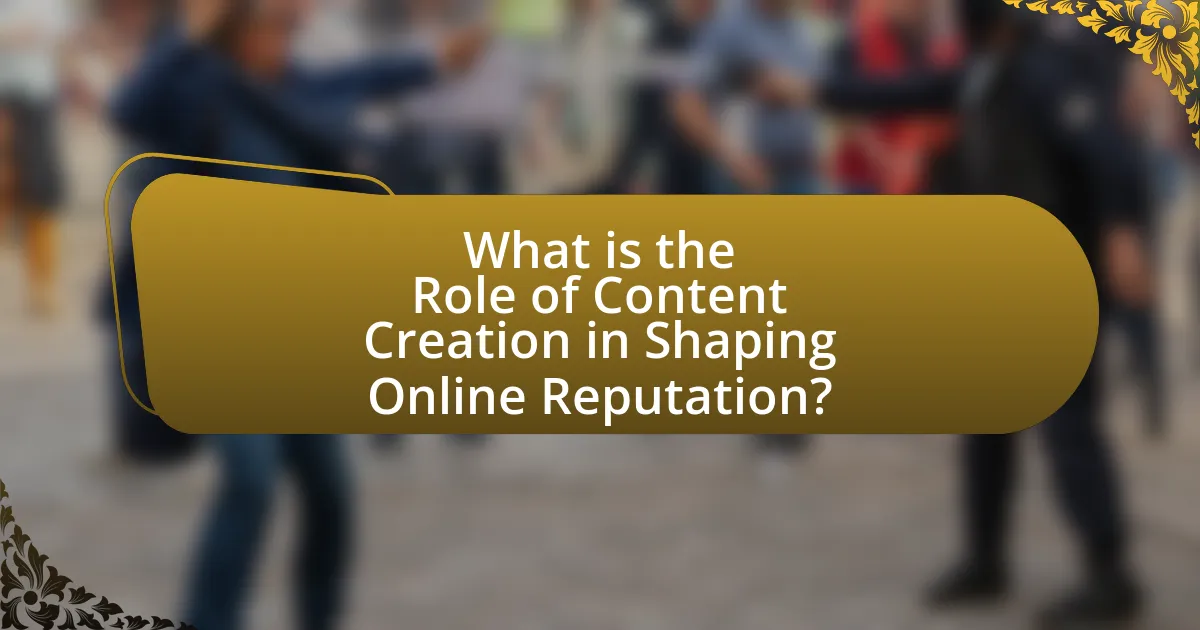Content creation is a vital component in shaping online reputation, significantly influencing public perception and engagement. High-quality, relevant content establishes authority and trust, which are essential for a positive online image. The article explores how content creation affects public perception, the types of content that are most effective, and the impact of content quality on reputation. It also discusses the importance of online reputation for individuals and businesses, the consequences of a negative reputation, and strategies for enhancing content creation to manage reputation effectively. Additionally, the role of storytelling, social media, and audience engagement in content strategy is examined, along with best practices for monitoring and improving online reputation through content.

What is the Role of Content Creation in Shaping Online Reputation?
Content creation plays a crucial role in shaping online reputation by influencing public perception and engagement. High-quality, relevant content establishes authority and trust, which are essential for a positive online image. For instance, a study by the Content Marketing Institute found that 70% of consumers prefer to learn about a company through articles rather than advertisements, highlighting the effectiveness of informative content in building credibility. Additionally, consistent content creation fosters community interaction and feedback, allowing brands to manage their reputation proactively. This dynamic interaction can mitigate negative perceptions and enhance overall brand loyalty.
How does content creation influence public perception?
Content creation significantly influences public perception by shaping narratives and framing information that audiences consume. Through various formats such as articles, videos, and social media posts, content creators can highlight specific aspects of a topic, thereby guiding audience opinions and attitudes. For instance, a study by the Pew Research Center found that 64% of Americans believe that social media has a major impact on their views about current events, illustrating how content can sway public opinion. Additionally, consistent messaging and branding in content can reinforce perceptions, making them more likely to be accepted as truth by the audience.
What types of content are most effective in shaping reputation?
The types of content most effective in shaping reputation include customer testimonials, case studies, expert articles, and social media engagement. Customer testimonials provide firsthand accounts of experiences, which can significantly influence potential customers’ perceptions. Case studies showcase successful outcomes and demonstrate expertise, reinforcing credibility. Expert articles establish authority in a field, while social media engagement fosters direct interaction and builds community trust. Research indicates that 79% of consumers trust online reviews as much as personal recommendations, highlighting the impact of user-generated content on reputation.
How does the quality of content impact online reputation?
The quality of content significantly impacts online reputation by influencing audience perception and engagement. High-quality content fosters trust and credibility, leading to positive interactions and brand loyalty. For instance, a study by the Content Marketing Institute found that 70% of consumers prefer to learn about a company through articles rather than advertisements, indicating that well-crafted content can enhance a brand’s image. Conversely, low-quality content can result in misinformation, negative reviews, and diminished trust, ultimately harming a brand’s reputation. Therefore, the caliber of content directly correlates with how a brand is perceived online.
Why is online reputation important for individuals and businesses?
Online reputation is crucial for individuals and businesses because it directly influences trust, credibility, and decision-making. A positive online reputation can lead to increased customer loyalty and higher sales, as 84% of people trust online reviews as much as personal recommendations. Conversely, a negative reputation can deter potential customers and harm professional relationships, with 70% of consumers admitting they would avoid a business with negative reviews. Therefore, managing online reputation is essential for success in today’s digital landscape.
What are the consequences of a negative online reputation?
A negative online reputation can lead to significant consequences, including loss of customers, decreased sales, and damage to brand credibility. Businesses with poor online reviews can experience a 22% decrease in customer engagement, as indicated by a study from Harvard Business School, which found that a one-star increase in Yelp ratings can lead to a 5-9% increase in revenue. Additionally, individuals with a tarnished online image may face challenges in securing employment, as 70% of employers use social media to screen candidates, according to a survey by CareerBuilder. This highlights the critical impact that a negative online reputation can have on both personal and professional opportunities.
How can a positive online reputation benefit a brand?
A positive online reputation can significantly benefit a brand by enhancing customer trust and loyalty. When consumers perceive a brand positively, they are more likely to engage with it, leading to increased sales and customer retention. According to a study by the Harvard Business Review, brands with strong reputations can charge up to 20% more for their products compared to competitors with weaker reputations. Additionally, a positive online presence can improve search engine rankings, making it easier for potential customers to find the brand. This visibility can lead to higher traffic and conversion rates, ultimately contributing to the brand’s growth and success.

What strategies can enhance content creation for online reputation management?
To enhance content creation for online reputation management, organizations should focus on producing high-quality, relevant, and engaging content that addresses the needs and concerns of their audience. This strategy involves conducting thorough audience research to understand their preferences and pain points, which can guide the creation of tailored content that resonates with them. Additionally, utilizing SEO best practices ensures that the content is discoverable, increasing its reach and impact.
Incorporating user-generated content, such as testimonials and reviews, can also strengthen credibility and foster trust among potential customers. Regularly updating content to reflect current trends and information keeps the brand relevant and authoritative in its field. Furthermore, leveraging social media platforms for content distribution amplifies visibility and encourages audience interaction, which can positively influence public perception.
These strategies are supported by studies indicating that brands with consistent, high-quality content experience improved online reputation metrics, such as increased positive sentiment and higher engagement rates.
How can storytelling be used in content creation?
Storytelling can be used in content creation to engage audiences emotionally and convey messages effectively. By crafting narratives that resonate with the target audience, content creators can enhance relatability and foster a deeper connection. Research indicates that stories are 22 times more memorable than facts alone, highlighting their power in retention and impact. This emotional engagement not only captures attention but also encourages sharing, thereby amplifying reach and influence in shaping online reputation.
What elements make a compelling story for online audiences?
A compelling story for online audiences includes relatable characters, a clear conflict, emotional engagement, and a satisfying resolution. Relatable characters allow audiences to connect personally, while a clear conflict drives the narrative forward, creating tension and interest. Emotional engagement is crucial, as stories that evoke feelings can lead to stronger audience retention and sharing. Finally, a satisfying resolution provides closure, leaving audiences fulfilled and more likely to engage with future content. Research indicates that stories with these elements are more likely to be shared, enhancing online reputation and visibility.
How does storytelling affect audience engagement?
Storytelling significantly enhances audience engagement by creating emotional connections and fostering relatability. When narratives are employed, they capture attention and stimulate interest, leading to increased retention of information. Research indicates that stories activate multiple areas of the brain, making the experience more immersive; for instance, a study published in the journal “Neuroscience” found that storytelling can increase the likelihood of information being remembered by up to 22 times compared to facts alone. This heightened engagement not only keeps audiences interested but also encourages sharing and interaction, ultimately shaping a positive online reputation for the content creator.
What role do social media platforms play in content creation?
Social media platforms serve as essential tools for content creation by providing users with accessible channels to share, distribute, and engage with various forms of media. These platforms enable individuals and organizations to create and publish content in real-time, fostering interaction and feedback from audiences. According to a 2021 report by Statista, over 4.2 billion people worldwide use social media, highlighting its significant role in shaping public perception and online reputation. The interactive nature of social media allows for immediate audience engagement, which can amplify content reach and influence, thereby impacting how brands and individuals are perceived online.
How can businesses leverage social media for reputation building?
Businesses can leverage social media for reputation building by actively engaging with their audience and creating valuable content that reflects their brand values. By consistently sharing informative, entertaining, and relevant posts, businesses can foster a positive image and build trust with their followers. For instance, according to a 2021 survey by Sprout Social, 70% of consumers feel more connected to brands that engage with them on social media, highlighting the importance of interaction in reputation management. Additionally, responding promptly to customer inquiries and addressing negative feedback publicly can demonstrate accountability and enhance credibility, further solidifying a positive reputation.
What are the risks of social media content on reputation?
Social media content poses significant risks to reputation, primarily through the potential for misinformation, negative comments, and viral backlash. Misinformation can spread rapidly, leading to public misperceptions that damage credibility; for instance, a 2020 study by the Pew Research Center found that 64% of Americans believe misinformation has caused confusion about basic facts. Negative comments or reviews can deter potential customers and harm brand image, as 79% of consumers report trusting online reviews as much as personal recommendations, according to BrightLocal’s 2020 survey. Additionally, content that goes viral for the wrong reasons can lead to reputational crises, as seen in numerous cases where brands faced public outrage due to poorly thought-out posts. These factors collectively illustrate how social media content can severely impact an individual’s or organization’s reputation.

What are the best practices for content creation to shape online reputation?
The best practices for content creation to shape online reputation include producing high-quality, relevant content, engaging with the audience, and maintaining consistency across platforms. High-quality content establishes authority and trust, as evidenced by a study from the Content Marketing Institute, which found that 70% of consumers prefer to learn about a company through articles rather than ads. Engaging with the audience through comments and social media fosters community and loyalty, while consistency in messaging and branding helps reinforce the desired reputation. Additionally, optimizing content for search engines increases visibility, further enhancing online reputation.
How can consistency in content creation affect reputation?
Consistency in content creation positively affects reputation by establishing trust and reliability among the audience. When content is regularly published, it signals to followers that the creator is committed and engaged, which fosters a sense of loyalty. Research indicates that brands that maintain a consistent posting schedule see a 67% increase in audience engagement, reinforcing their credibility. This consistent engagement leads to a stronger online presence, as audiences are more likely to share and recommend content from creators they perceive as reliable.
What are the benefits of a content calendar for reputation management?
A content calendar significantly enhances reputation management by providing a structured approach to content creation and publication. This organization allows businesses to plan and align their messaging with their brand values, ensuring consistency and relevance in communication. Furthermore, a content calendar facilitates timely responses to emerging trends or crises, enabling proactive reputation management. Research indicates that brands with a consistent content strategy experience a 67% increase in engagement, which directly correlates with improved public perception. By scheduling content in advance, organizations can also monitor and analyze audience reactions, allowing for adjustments that further protect and enhance their reputation.
How does regular engagement with the audience enhance reputation?
Regular engagement with the audience enhances reputation by fostering trust and loyalty. When organizations or individuals consistently interact with their audience, they demonstrate transparency and responsiveness, which are critical factors in building a positive reputation. Research indicates that brands that engage with their audience on social media see a 20-40% increase in customer loyalty, as active communication creates a sense of community and belonging. Furthermore, regular engagement allows for feedback, enabling continuous improvement and alignment with audience expectations, which further solidifies a favorable reputation.
What tools can assist in monitoring online reputation through content creation?
Tools that assist in monitoring online reputation through content creation include Google Alerts, Brand24, and Hootsuite. Google Alerts allows users to track mentions of their brand or specific keywords across the web, providing real-time updates on new content. Brand24 offers social media monitoring and analytics, enabling users to see how their content is perceived and shared online. Hootsuite facilitates the management of social media accounts, allowing users to monitor engagement and sentiment related to their content. These tools collectively help in assessing the impact of content on online reputation by providing insights into audience reactions and trends.
How can analytics tools help in assessing content effectiveness?
Analytics tools help in assessing content effectiveness by providing measurable data on audience engagement, reach, and conversion rates. These tools track metrics such as page views, time spent on page, bounce rates, and social shares, allowing content creators to evaluate which pieces resonate most with their audience. For instance, a study by HubSpot found that companies that utilize analytics tools see a 5-10% increase in content engagement, demonstrating the direct impact of data-driven insights on content strategy. By analyzing this data, organizations can refine their content to better align with audience preferences, ultimately enhancing their online reputation.
What role do feedback and reviews play in content strategy?
Feedback and reviews are critical components of content strategy as they provide insights into audience preferences and perceptions. By analyzing feedback, content creators can identify what resonates with their audience, allowing for the refinement of content to better meet user needs. Research indicates that 79% of consumers trust online reviews as much as personal recommendations, highlighting the influence of reviews on consumer behavior and decision-making. This data underscores the importance of integrating feedback and reviews into content strategy to enhance engagement and improve overall effectiveness.
What practical tips can improve content creation for online reputation?
To improve content creation for online reputation, focus on producing high-quality, relevant, and engaging content that aligns with your audience’s interests. Consistently publishing informative articles, videos, or social media posts enhances visibility and establishes authority in your niche. Research shows that 70% of consumers prefer getting to know a company via articles rather than ads, indicating that valuable content fosters trust and credibility. Additionally, optimizing content for search engines through effective keywords and meta descriptions can increase discoverability, further enhancing online reputation.

Leave a Reply